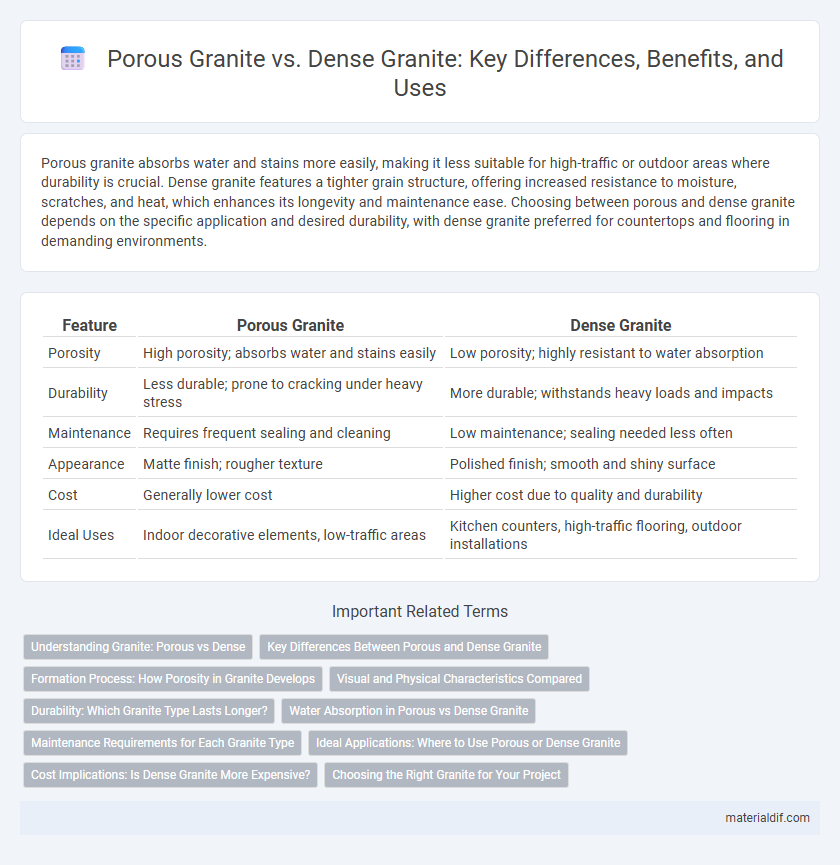Porous granite absorbs water and stains more easily, making it less suitable for high-traffic or outdoor areas where durability is crucial. Dense granite features a tighter grain structure, offering increased resistance to moisture, scratches, and heat, which enhances its longevity and maintenance ease. Choosing between porous and dense granite depends on the specific application and desired durability, with dense granite preferred for countertops and flooring in demanding environments.
Table of Comparison
| Feature | Porous Granite | Dense Granite |
|---|---|---|
| Porosity | High porosity; absorbs water and stains easily | Low porosity; highly resistant to water absorption |
| Durability | Less durable; prone to cracking under heavy stress | More durable; withstands heavy loads and impacts |
| Maintenance | Requires frequent sealing and cleaning | Low maintenance; sealing needed less often |
| Appearance | Matte finish; rougher texture | Polished finish; smooth and shiny surface |
| Cost | Generally lower cost | Higher cost due to quality and durability |
| Ideal Uses | Indoor decorative elements, low-traffic areas | Kitchen counters, high-traffic flooring, outdoor installations |
Understanding Granite: Porous vs Dense
Porous granite features natural micro-pores that absorb water and stains more easily, making it less resistant to moisture and requiring regular sealing for protection. Dense granite exhibits a compact structure with minimal porosity, offering superior durability, reduced water absorption, and enhanced resistance to staining and wear. Understanding the difference between porous and dense granite helps in selecting the right material for countertops, flooring, or exterior cladding based on exposure and maintenance needs.
Key Differences Between Porous and Dense Granite
Porous granite contains microscopic pores that absorb water and stains more easily, leading to a higher likelihood of damage and requiring regular sealing for maintenance. Dense granite has a tightly compacted crystal structure, making it more resistant to moisture, scratches, and heat, ideal for high-traffic areas. The difference in porosity directly affects durability, cost, and suitability for various applications such as kitchen countertops or outdoor installations.
Formation Process: How Porosity in Granite Develops
Porosity in granite develops primarily during its slow crystallization from molten magma deep within the Earth's crust, where trapped gases and mineral-rich fluids create microscopic voids and fractures. Dense granite forms when the magma cools uniformly, resulting in closely interlocked mineral crystals with minimal pore spaces. Variations in cooling rate, the presence of volatiles, and tectonic stresses influence the extent of porosity, directly impacting granite's durability and permeability.
Visual and Physical Characteristics Compared
Porous granite features visible tiny pits and micro-cracks that give a rougher texture and a matte appearance, whereas dense granite exhibits a smooth, polished surface with minimal imperfections and a glossy finish. Physically, porous granite tends to absorb moisture and stains more readily, making it prone to discoloration and requiring more maintenance, while dense granite offers superior durability, resistance to scratching, and low porosity that prevents water infiltration. The difference in density directly influences granite's hardness, weight, and suitability for high-traffic areas or outdoor installations.
Durability: Which Granite Type Lasts Longer?
Dense granite exhibits superior durability compared to porous granite due to its tightly packed mineral structure, reducing susceptibility to water absorption, staining, and surface erosion. Porous granite, with its open pores, is more prone to wear and damage from environmental factors, which can shorten its lifespan when exposed to heavy use or harsh conditions. Therefore, dense granite is generally preferred for long-lasting applications in countertops, flooring, and exterior cladding where longevity is critical.
Water Absorption in Porous vs Dense Granite
Porous granite exhibits higher water absorption rates, typically ranging from 0.5% to 2%, due to its increased surface porosity and micro-cracks. Dense granite, with a compact grain structure, has significantly lower water absorption, often less than 0.1%, making it more resistant to moisture penetration and staining. This fundamental difference impacts durability and suitability for outdoor applications or environments with high moisture exposure.
Maintenance Requirements for Each Granite Type
Porous granite requires more frequent sealing and cleaning to prevent staining and moisture absorption, making regular maintenance essential to preserve its appearance and durability. Dense granite, with its tightly packed crystals and low porosity, resists water and dirt penetration, reducing the need for frequent sealing and simplifying routine cleaning. Maintaining porous granite involves vigilant care to avoid damage, while dense granite offers a more resilient, low-maintenance surface suitable for high-traffic areas.
Ideal Applications: Where to Use Porous or Dense Granite
Porous granite is ideal for outdoor applications such as landscaping, garden pathways, and exterior cladding where natural drainage and breathability are essential to prevent water accumulation and freeze-thaw damage. Dense granite suits indoor environments like kitchen countertops, bathroom vanities, and flooring because its low porosity resists stains, moisture penetration, and wear from regular use. Choosing the appropriate granite type ensures durability and performance tailored to environmental conditions and functional demands.
Cost Implications: Is Dense Granite More Expensive?
Dense granite generally incurs higher costs due to its superior durability and lower porosity, which enhances resistance to staining and weathering. Porous granite often requires additional sealing and maintenance, increasing long-term expenses despite its lower initial price. Evaluating total lifecycle costs reveals dense granite as a more cost-effective choice for high-traffic or exterior applications.
Choosing the Right Granite for Your Project
Porous granite absorbs water and stains more easily, making it less suitable for high-moisture environments or kitchen countertops where spills are frequent. Dense granite has a tighter grain structure, offering superior durability, resistance to stains, and longevity, ideal for outdoor installations and heavy-use surfaces. Selecting the right granite depends on project needs, balancing aesthetic preferences with functional requirements such as maintenance level and environmental exposure.
Porous Granite vs Dense Granite Infographic

 materialdif.com
materialdif.com